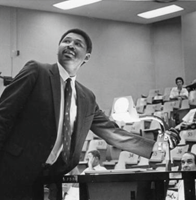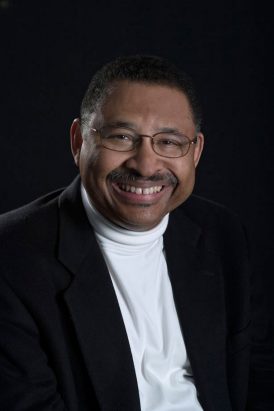
An engaging professor and a passionate researcher, Dr. Homer Alfred Neal was a legend in the scientific community, endeavoring to broaden engagement with physics research and encouraging researchers to share in the “joys of discovery”.
Born in Franklin, Kentucky in 1942, Dr. Neal developed a passion for exploration and science at an early age. He undertook advanced studies as a teenager, and spent much time on a radio receiver and transmitter of his own creation, communicating to individuals around the globe via Morse Code.
At Indiana University, Dr. Neal completed his undergraduate degree in Physics (with Honors) by the age of 19. Subsequently, he studied at the University of Michigan through the John Hay Whiney Fellowship, earning a doctorate in Physics in 1966. His dissertation focused on the polarization parameter in elastic proton-proton scattering. He also held honorary degrees from Michigan State University, Notre Dame University, and Indiana University.

In 1967, Dr. Neal earned a National Science Foundation fellowship, providing him the opportunity to spend a year at CERN. After this international experience, he returned to Indiana University as Assistant Professor of Physics, instructing students and completing research on polarization and proton structure at national labs such as SLAC National Accelerator Laboratory, Argonne Zero-Gradient Synchrotron, and Fermi National Accelerator Laboratory (Fermilab). Dr. Neal’s ingenious research techniques provided insight on the interactions of quarks - or the fundamental particles that make up protons.
Dr. Neal was instrumental in the expansion of Indiana University’s Physics Department, from spearheading research efforts in experimental particle physics, to establishing contracts with the Department of Energy. Due to these pioneering feats, Dr. Neal was promoted to Professor of Physics at IU in 1972, then as the Dean of Research and Graduate Development until 1981. During his time at Indiana University, Dr. Neal helped found the IU Art Museum, began the journal Research and Creative Activity, and established a minority fellowship program.
In 1981, Dr. Neal moved to Stony Brook University as Professor of Physics, Provost, and Vice President of Academic Affairs until 1986. In 1987, he returned to his alma mater, the University of Michigan, as a faculty member and chair of the physics department, and later Interim President in 1996. At Michigan, Dr. Neal organized a research group that participated in the DZero experiment at Fermilab, playing a crucial role in the discovery of the top quark, and heavily influencing the discoveries of Ξb and Ωb baryons. Dr. Neal worked on many major high-energy accelerator projects across the globe, including leading another Michigan-based research group in the ATLAS Experiment at the Large Hadron Collider at CERN, contributing to the discovery of the Higgs boson.

Dr. Neal received many accolades during his long career, including the Outstanding Teacher Award from the IU Department of Physics, Sloan Foundation Fellowship, Guggenheim Fellowship, a Fellow of the American Physical Society, American Association for the Advancement of Science, and the American Academy of Arts & Sciences. He received the APS Bouchet Award, IU’s Distinguished Alumni Service Award, and the Stony Brook Medal. In 2020, Indiana University’s Department of Physics established the Homer Neal Diversity Student Support Fund to recognize Dr. Neal’s incredible contributions to the field of high-energy physics and to provide opportunities for minority scholars to follow in his footsteps of ingenuity and discovery.
Outside of the classroom and labs, Dr. Neal served as President of the American Physical Society (2016), board member of the Ford Motor Company (1997 - 2014), director of the Richard Lounsbery Foundation, council member of the Smithsonian National Museum of African American History & Culture, and on the National Science Board. Dr. Neal played a pivotal role in the development of the Research Experiences for Undergraduates (REU) program, providing undergraduate students an opportunity to experience real-world research alongside their studies.
A tenacious and highly energetic high-energy physicist, Dr. Homer Alfred Neal played an integral role in many groundbreaking discoveries in physics throughout his long and illustrious career. Dr. Neal’s influence on his students and colleagues, both in academia and professionally, will continue to have an impact on future discoveries in high-energy physics.


 The College of Arts
The College of Arts